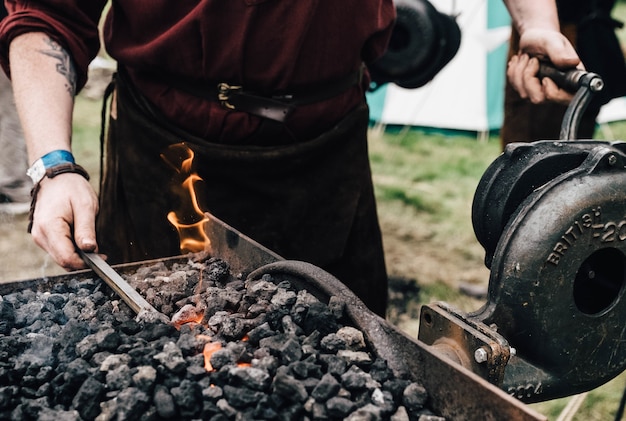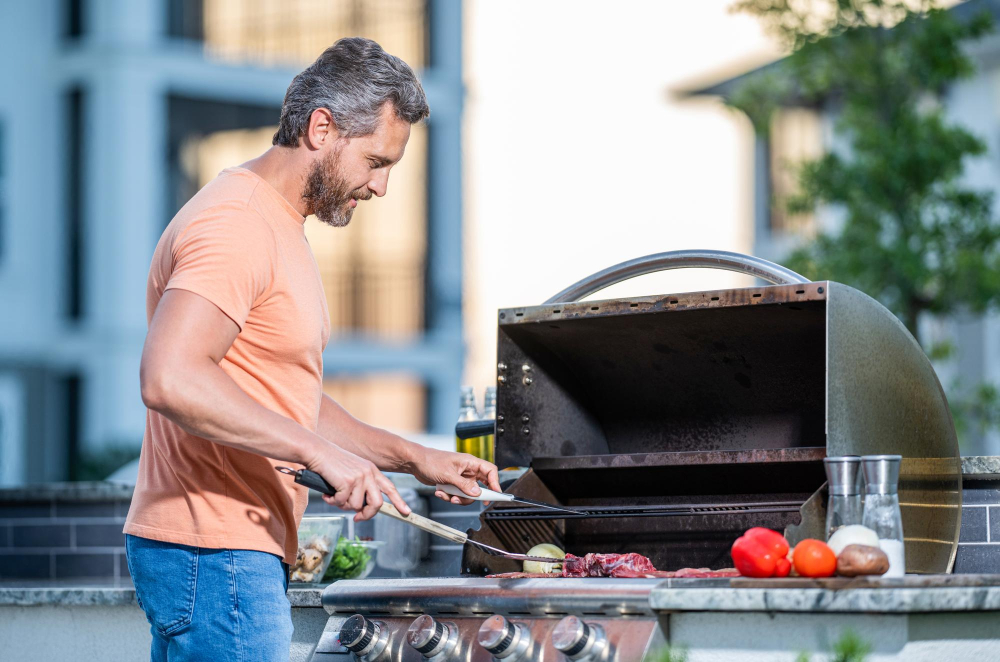Do I need coals for a gas BBQ?
If you own a gas barbecue or are considering purchasing one, you may be wondering whether you need to use coals alongside the gas burners. The answer to this question depends on your personal preference and the desired cooking experience.
Using Coals for Flavor
One of the main reasons people choose to use coals in addition to gas is to add a smoky flavor to their food. While gas grills offer convenience and precise temperature control, they often lack the distinct flavor that comes from cooking over charcoal. If you enjoy the taste of food cooked over charcoal and want that authentic bbq flavor, using coals in your gas barbecue might be a good option.
Tip: For the best flavor results, consider using lumpwood charcoal instead of briquettes. Lumpwood charcoal is made from natural wood and burns at a higher temperature, providing a more intense smoky flavor.
Heat Distribution and Control
Another factor to consider when deciding whether to use coals in your gas barbecue is heat distribution and control. Gas burners provide even heat distribution across the grill surface, allowing you to cook different foods simultaneously. However, using coals can create hotter spots on the grill, which can be beneficial for searing steaks or achieving a charred crust on certain dishes.
If you decide to use coals, it’s important to remember that they will require additional attention and maintenance. You’ll need to monitor the temperature carefully and adjust the positioning of the coals to ensure even cooking. Gas grills, on the other hand, offer more precise temperature control and are generally easier to operate.
Benefits of Using Just Gas
While using coals in a gas barbecue can enhance the flavor and cooking experience, there are also benefits to using just gas as your fuel source. Gas grills offer convenience, quick heat-up times, and easier cleanup compared to traditional charcoal grills. They also eliminate the need for purchasing and storing bags of charcoal.
Did You Know? Gas grills are often seen as more environmentally friendly since they produce fewer emissions and do not require cutting down trees for charcoal production.
Which is Cheaper to Use: Propane or Butane?
When it comes to choosing between propane and butane as a fuel source, the cost-effectiveness is an important factor to consider. Both propane and butane are commonly used for heating, cooking, and powering various appliances. However, their prices can vary depending on several factors.
Price Comparison
Propane and butane are both liquefied petroleum gases (LPG), which means they are derived from fossil fuels. In the United Kingdom, the prices of propane and butane are influenced by market demand, transportation costs, and other factors. Generally, propane tends to be slightly more expensive than butane due to its higher energy content.
According to recent price data, propane is priced at an average of £0.55 per liter, while butane is priced at around £0.50 per liter. These prices may vary depending on your location and the supplier you choose. It is advisable to check with local suppliers or utility companies for accurate pricing information.
Factors Affecting Cost
The cost of using propane or butane also depends on the specific application and efficiency of the equipment being used. Some factors to consider include:
- Energy Content: Propane contains more energy per unit volume compared to butane, meaning you may need less propane to achieve the same level of heat. This can impact the overall cost of fuel consumption.
- Appliance Efficiency: The efficiency of appliances can vary, and using a more efficient appliance can help reduce fuel consumption and lower costs.
- Delivery and Storage: Consider the cost of delivery and storage options for both propane and butane. Some suppliers may offer discounts or special deals on bulk purchases.
Final Verdict
While both propane and butane have their advantages and disadvantages, the choice between the two ultimately depends on your specific needs and preferences. If cost is a primary concern, butane may be a slightly cheaper option due to its lower price per liter. However, it’s important to consider energy content, appliance efficiency, and other factors that can affect long-term costs.
In the end, it is recommended to compare prices from different suppliers, evaluate the energy efficiency of your appliances, and consider your usage requirements before making a decision.
Remember, safety should always be a top priority when handling and using propane or butane. Follow proper guidelines and regulations to ensure the safe and efficient use of these fuels.
Can I swap Calor butane for propane?
When it comes to using gas for heating, cooking, or other appliances, many people wonder whether they can interchange Calor butane and propane. Both butane and propane are commonly used as fuel sources in the UK, but they have slightly different properties and uses. So, can you swap Calor butane for propane? Let’s find out.
Differences between Calor butane and propane
Calor butane and propane are both liquefied petroleum gases (LPG), but they have distinct characteristics. Butane typically has a higher energy content per unit volume, making it better suited for indoor applications like heating and cooking. Propane, on the other hand, has a lower boiling point and performs better in colder temperatures, making it more suitable for outdoor use and powering vehicles.
Swapping Calor butane for propane – considerations
If you’re considering swapping Calor butane for propane, here are a few key factors to keep in mind:
- Appliance compatibility: Before making the switch, ensure that your appliance is compatible with propane. Some appliances may require specific pressure settings or regulators that differ between butane and propane.
- Gas bottle compatibility: Check if your existing gas bottle is compatible with propane. While many bottles are designed to accommodate both butane and propane, it’s essential to verify this to avoid any issues.
Benefits of swapping to propane
There are several potential benefits to swapping Calor butane for propane:
- Higher heat output: Propane generally provides a higher heat output, which can be advantageous for certain applications like outdoor grilling.
- Increased performance in colder weather: Propane has a lower freezing point than butane, making it a more reliable fuel option during colder months.
- Wider availability: Propane is often more readily available in rural areas compared to butane, making it a convenient choice for those living in such locations.
“Before attempting to swap gas types, it’s always a good idea to consult the manufacturer’s guidelines or seek advice from a certified gas engineer.”
In conclusion, swapping Calor butane for propane is possible, but it’s essential to consider appliance and gas bottle compatibility. It’s also worth noting the differences in energy content and temperature performance between the two gases. Before making any changes, consult manufacturer guidelines or seek advice from a certified gas engineer to ensure a seamless and safe transition.
Can I use a propane regulator with butane?
Propane and butane are both commonly used as fuel sources for various applications, such as barbecues, camping stoves, and heaters. While propane and butane regulators may look similar, it is important to understand the differences between them and whether they can be used interchangeably.
Propane Regulators
A propane regulator is specifically designed to regulate the flow of propane gas from the cylinder to the appliance. It ensures a consistent and safe pressure for optimal performance. Propane has a higher vapor pressure than butane, so propane regulators are typically built to handle higher pressures.
Butane Regulators
Similarly, a butane regulator is designed for use with butane gas. Butane has a lower vapor pressure than propane, requiring a regulator that can handle lower pressures. Using a propane regulator with butane could result in insufficient gas flow, leading to poor performance or even safety hazards.
It is important to use the appropriate regulator for the specific gas you are using. While some regulators are designed to be compatible with both propane and butane, it is recommended to check the manufacturer’s specifications to ensure compatibility.
Regulator Compatibility
Regulator compatibility can vary depending on the specific model and brand. Some regulators are designed to be dual-fuel, meaning they can be used with both propane and butane. These regulators typically have adjustable settings to accommodate the different pressures of each gas.
Always consult the manufacturer’s guidelines or seek professional advice before attempting to use a propane regulator with butane.
If you are unsure about the compatibility of your regulator or need to switch between propane and butane, it is best to consider purchasing a dedicated regulator for each gas. This will ensure optimal performance, efficiency, and safety.
Conclusion
In summary, while some regulators are designed to be compatible with both propane and butane, it is crucial to check the manufacturer’s specifications and guidelines. Using the wrong regulator can lead to unsafe conditions or poor performance. It is recommended to use dedicated regulators for each gas or invest in dual-fuel regulators specifically designed to handle both propane and butane.



